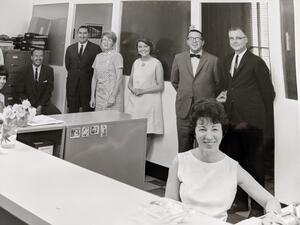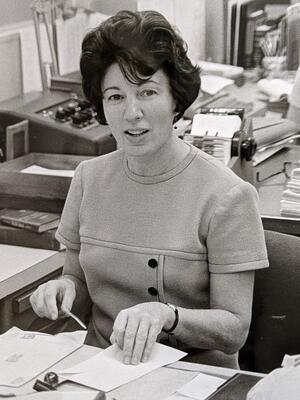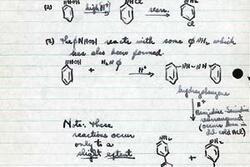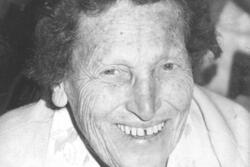Knocking on Harvard's Glass Ceiling
“I’ll be frank with you: Harvard is a man’s institution. Women don’t get anywhere. But, [they] run the university.”
This was the answer Miriam Rykles, now 94, received when she applied to work in Harvard University’s physics department in 1962. In the more than 30 years that followed, Rykles would work with Nobel Prize-winning physicists, help manage the lab’s Cambridge Electron Accelerator, and witness one of the first US-Russia relationships during the Cold War, all under the modest title of Administrative Assistant.
This story may sound familiar because it’s also the story of many other women who sought careers in the mid-twentieth century and were met with skepticism. While working conditions for women in America have improved significantly, it’s crucial to acknowledge that for decades, women have been performing the grunt work—and more—to help run institutions like Harvard.
Rykles doesn’t have more than a high school background in physics. In fact, her story begins a long way from Harvard. Originally from Wilno, Poland (present day Vilnius, Lithuania), Rykles was only sixteen when she was forced into the city’s ghetto in 1941. After the ghetto’s liquidation two years later, Rykles was sent to labor camps until Europe’s liberation in 1945 after the Nazis surrendered. This story, unfortunately, also resonates with many people.
After the war, she made her way to Warsaw. Competent in Yiddish, Polish, English, German, and Russian, she found work there as a translator. That same year, a French cousin persuaded her to move to Paris. In the early 1950s, more relatives found Rykles through the Red Cross and invited her to live with them in America. In October 1952, at age 27, Rykles arrived in Massachusetts. She initially found work with an insurance company, but found it dull. Unwilling to settle for any old American job, she went to Harvard in search of more interesting work.
“At that time, women were looking for something interesting to do,” Rykles says. “For a woman to apply for an office job, it meant being a clerical worker, a secretary. You were answering the phone, typing, taking shorthand.” However, the duties a secretary performed often went beyond this job description. Rykles and her female colleagues were on the lowest rung, but performed work at levels comparable to their male superiors.
“I spent time talking to the other secretaries who were taking dictation, answering the phone, but at the same time, they were answering very important questions for their bosses,” Rykles says. She describes the “impossible task” of trying to show the other women that they were as capable and intelligent as the other men in the office. “I would talk to a secretary who was running the office and really answering questions of policy and all kinds of things. I would sit there and watch her work and catch her each time she’d say something about policy. I’d say, ‘Look, Carol, this is not secretarial work. This is your boss’s work. You just told him the policy.’ And she just couldn’t get it.”
Rykles describes women at Harvard as “shadows”—they were nearly invisible, but moved in lockstep with their male bosses, sometimes doing their work for them. Her boss, leading high-energy physicist Karl Strauch, noticed her curiosity and nurtured it. He trusted her with more responsibilities. In addition to teaching two classes at Harvard, Strauch was involved in cultivating America’s scientific relationship with Europe.
“He had an office in Switzerland where he had an experiment going,” Rykles says. “There was always a relationship between CERN (European Council for Nuclear Research) and Harvard…He had certain committees on that.” Some of Rykles’s work included preparing materials and changing contracts for such committees.
As Strauch was so involved with CERN, he was close to physicists from the USSR. Consequently, Rykles had access to all phases of the fledgling relationship between the US and the USSR, held together by the tenuous connection of physics. According to a 1990 paper by Roy Rubinstein, former director of particle physics and accelerator laboratory Fermilab, the two nations began collaborating on high-energy physics in 1966. Rykles helped to organize the 6th International High-Energy Accelerators Conference in Cambridge in 1967. She had access to one of the first amicable connections between these sparring nations.
Rykles’s language skills, which initially won her a translation job in Warsaw after the war, proved critical at Harvard. She used Russian for translating letters between the department director and Soviet physicists. Eventually, in the 80s, a personal telegraph was installed in her office so she could communicate directly with the Russian Academy of Sciences. Her Russian was so good that when one of the department’s physicists began learning the language, she jokingly told him, “You will never catch up with me!”
Although Rykles and the other women working in the physics department were performing duties outside their job descriptions, they didn’t receive commensurate compensation. So, why did she stay?
“I liked the work,” she says. “I had access to everything.” Between her curiosity and Strauch’s support, she had the freedom to do what she wanted. She realized just how much power she wielded, all things considered, and how much knowledge her curiosity afforded her. “I...learned things that no women would probably dare learn; women were really supposed to ‘not know’ and so they didn’t.”
Rykles’s influence was subtle but effective. Her efforts may have gone undetected, but they were of consequence. Her curiosity compelled her to pore over the documents in her possession, and often keep things because she found them interesting. At one point, this tendency led her to make a crucial discovery.
“Experimental physicists are known for not keeping their papers. When it’s done and served the purpose, they throw the papers out,” Rykles says. “I did not.” She describes one experiment done at Cornell University that included participants from Harvard. One of the participating scientists wrote a “tongue-in-cheek” paper on the experiment, ridiculing its proposal. “I read it and it was fascinating,” Rykles says. Even though she was instructed to throw out these papers, she kept them because they were “too interesting to throw out.”
Twenty-five years later, Rykles learned that Nobel Prize-winning physicist Sheldon Glashow was trying to commercially develop a particular experiment. He found investors and was going full force. Rykles got ahold of his project description and noticed it looked familiar. She went to her files and found that wry paper from years ago, and realized it was the same experiment that Glashow was developing. “Officially, he would have to invite the former director of that project into his cooperation,” Rykles says. After Rykles made this catch, Glashow appointed the former director of the experiment as a corporate member. However, the one who originally wrote that wry paper “knew all along that it wouldn’t work.” And it didn’t.
Rykles worked as an administrative assistant for 30 years, and continued working freelance after her retirement in 1991 to assist Strauch, who had Parkinson’s. While her path is unique, her story as a curious, tenacious woman at Harvard is part of a larger, shared history of accomplished but unrecognized women. There are certainly many others like Rykles: women and other marginalized people who worked (and still work) as administrative assistants, but performed higher level jobs without recognition. Men’s successes are built on the backs of these people, and while, yes, men did make strides in research, physics, and beyond, they didn’t complete this work unaided. One doesn’t have to look too closely to see an army of women pushing progress forward.









Thank you for the story. I now live in Mrs. Rykles’ apartment and worked at Harvard dealing with Russian, and other materials from Central/Eastern Europe and thus I have often wondered about her life. Regret very much never unchecked never having met her.
Regret very much never having met Herve
Great article, Elana! I well remember Miriam Rykles's wit and lively intelligence from when we visited Spivack relatives during my parents' summer vacations. Having tried (not very successfully) to learn Russian in college and grad school, I remain very impressed and deeply envious of Miriam's language skills.
Great story! Thank you for bringing it to light.
Do you see a movie in this? Or a Radcliffe grad fellowship? Because I could see either or both!! Keep telling the unwritten stories!!
good job, Elana. Those were the days:-( I'd never heard the Shelly Glashow story. Thanks. -- S